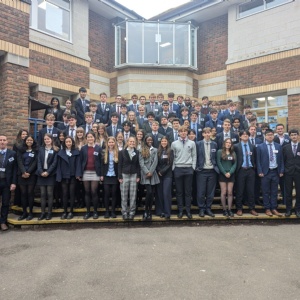Judd Model United Nations General Assembly 2025

On Wednesday 12th February, the Judd School Model United Nations Society met for its fourth annual General Assembly. This year, we were delighted to have the largest number of participants (72 in total from across Year 12 and 13) taking on the roles of either country delegates or members of the secretariat. 32 Member States were represented from all corners of the globe, from some of the demographically largest countries on earth to some of the physically more remote regions. Alongside the permanent members of the Security Council, some countries were being represented at Judd Model UN for the first time, including Kyrgyzstan, Timor-Leste, Tanzania and the Democratic Republic of the Congo.
Following some words of welcome from the Secretary-General, an address from our President highlighted the particular significance of this year; it is 80 years since the founding of the United Nations and therefore is a good opportunity to reflect on its many achievements but also the significant challenges still faced by the world, including poverty, conflict, resource depletion and climate change. We then heard opening addresses from delegations. The principle behind Model UN is that each delegation best represents their country's perspectives on a range of issues and tries to convey their country's spirit and demeanour in everything they do. The opening addresses undoubtedly set us off in that direction, with typically conciliatory words from many delegations while others did not wait to inject some cynicism (and even open hostility) towards others. For instance, the Chinese recognised "The Year of the Snake" as the perfect opportunity to reflect on the recent behaviour of the USA and the North Korean delegation drew on the ever-popular metaphor of the pink flamingo. Opening addresses were exceptionally well researched, full of wit and delivered with flair.
Delegations then split into two committees. Each committee had a pre-released draft resolution to work with and delegates could submit proposed amendments to the resolution which were then discussed and voted on. A majority vote is needed to pass each amendment and therein lies the challenge - to use diplomacy, cunning (and apparently occasional corruption) to shore up support for your proposal. Delegates had already begun to negotiate well before the committees met but some very thoughtful debate happened before each of the votes was taken. The focus of the first committee was 'Combatting Disinformation', a particularly pertinent issue that has been at the centre of many UN discussions for the last few years. Disinformation is often spread online but can cause real and lasting harm, including affecting responses to natural disasters or health crises but it can also be used to undermine public confidence in democracy and systems of government. In some cases, governments themselves have been accused of proliferating the spread of disinformation. Responses to it are very challenging though and this was the task of the first committee. 'Indigenous Rights' was the focus of the second committee and they were dealing with issues of discrimination against indigenous peoples worldwide, discussing actions taken by governments to deliberately undermine the human rights of certain indigenous groups but also considering the problems of land rights. This is a question that the United Nations has been trying to grapple with in recent years: can land claimed by an indigenous group for generations be granted to that group if there are other claims to ownership or if the land is part of a national park or wildlife reserve? Lively debate and thorough research were features of both committees and both succeeded in passing a final agreed resolution.
The day concluded with a discussion on an emergency resolution, the topic of which was 'The production, transfer and deployment of cluster munitions'. These weapons have been used in many parts of the world including in Ukraine and Gaza most recently. Despite their devastating impacts, surprisingly few countries have committed to prohibiting their use. Following some particularly impassioned speeches on this issue, a resolution was reached, though we feel this is a discussion that will probably continue outside this forum.
We are very proud of all the students who took part; this certainly was one of the best researched groups we have ever had and there were some exceptional performances. We hope that students thoroughly enjoyed the experience and may wish to experience Model UN in the future in some capacity. Special mention must go to the prize-winners but also my sincere thanks to the Secretariat for their support throughout the day, to the Chairs (Mrs Emmerson and Mr Davies) and to our President (Mr Burnie), all of whom made the Judd MUNGA 2025 such a success.
M Yarham
Secretary-General, Judd MUN
Prize winners:
Best Opening Address: North Korea (Joshua T)
Runners-up: Ukraine (Annalise S & Jared W), Finland (Tara R & William B)
Best Delegate for Combatting Disinformation: USA (Sam C)
Runners-up: Kyrgyzstan (Isaac Y), Syria (Leo G), Israel (Bo-Rui N)
Best Delegate for Indigenous Rights: China (James B)
Runners-up: Timor-Leste (Selena H), Democratic Republic of Congo (Annabelle L)
Honourable Mention for the Secretariat: Callum H & Max P
Best Overall Delegation: Belarus (Theo T & Aaron W)
Runners-up: USA (Sam C & Oliver C), Mexico (Jasper E & James B)
